
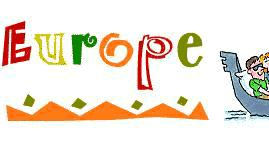







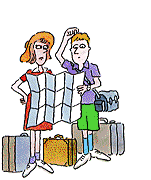 |
The first leg of your journey typically includes air travel...unless
you're taking a leisurely trans-Atlantic cruise. Here are a few insider
tips you can follow to ensure the best air travel arrangements possible...
Non-Stop Flights ~ Schedule non-stop flights whenever possible, especially if you are traveling with infants or small children. "Direct" flights typically can include multiple take-offs and landings. Arrive Early ~ Often airlines will ask you to be there two hours before your international flight. This allows time to leisurely check your luggage and obtain your seat assignments. Reconfirm Your Flight ~ Call your airline a day or two before you are scheduled to fly. Airlines sometimes change flight times without notifying you. Check Your Baggage Restrictions ~ Most airlines allow you to check two bags and carry one on. We'll be glad to give you the specifics on the airline you choose. Seat Assignments ~ Select a seat based on your personality and personal needs. Aisle seats offer quick access and exits without disturbing others in your row. Window seats provide a view and a side of the cabin's interior wall to rest your head against when sleeping. We will request the seat assignment that best fits your needs. Rely On Us ~ We will find the best airfare possible to accommodate your budget and travel needs. |

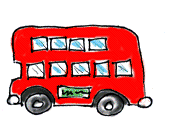 |
Flying through Europe is the fastest mode of
travel within Europe. We'll obtain the airfare that best fits your needs.
There are plenty of airlines with convenient schedules to whisk you within
the continent. Many European airfares allow free stopovers.
If you have the time, train travel is an economical and convenient way to travel through Europe. You can leisurely relax while you pass through the beautiful countryside. Ask us about a Rail Pass for a train trip through Europe. Motorcoach vacations provide maximum convenience and greatest learning potential. Local guides (who speak the language) travel with you to point out local history and sightseeing highlights along the way. Our travel professionals will assist you in choosing an escorted or locally hosted motorcoach tour if you prefer this mode of travel. Provided you are comfortable with driving on the left in some countries, consider a fly/drive vacation. These trips usually include airfare, accommodations, a rental car...a map...and the freedom to travel where you want, when you want! |

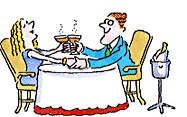 |
As you venture overseas, the first change most Americans
encounter is breakfast. For example, in much of Europe, common breakfast
fare often consists of cold cuts, hard rolls, cheese, and coffee or tea.
However, most hotels who entertain international guests will probably cater
to all tastes...including your favorite brand of cereal.
Depending on the country you visit, what Americans consider lunch is the main meal of the day. If you have trouble downing a three course meal at noon (especially after cold cuts at breakfast), you can simply order a few appetizers in lieu of the full course feast. Dinner in Europe is usually a lighter fare (the opposite of our pattern: light lunch and heavy dinner). Be prepared to be flexible in dining in Europe...and maybe reverse the habit! When you open a menu, don't be afraid of all the foreign words and exotic dishes. Ask if a menu in English is available, or ask the waiter for a verbal translation. Above all, be flexible. Don't be afraid to try new and unusual foods. It will enhance the experience of your European adventure! In many countries, food will not be served simultaneously or on the same plate, but in a succession of dishes. Remember, in Europe you are not getting bad service when your lunch or dinner lasts 2 or 3 hours. Just relax and enjoy! Most Europeans do not order coffee with a meal but afterwards, so you may have to ask. In most European restaurants, a service charge is automatically added to the bill so check before leaving an additional tip. Restaurant reservations are very important in Europe. Call early for reservations or have the concierge call if there is a language problem (this service should be rewarded with a tip). Also, make reservations for lunch as in many areas it can be the main meal. |
 |
Shopping in Europe is a true adventure. There are a variety
of values through every country. When purchasing items you just can't resist,
keep in mind that a U.S. citizen can bring back up to $400 per person worth
of purchases without paying duty to U.S. Customs.
Bargaining can be fun and is expected in almost every European country when you shop at open markets, antique shops, art galleries and flea markets. In Spain, Portugal and Greece, it is actually improper to pay the asking price! Avoid most duty free shops in airports and train stations. They are often higher priced than comparable prices in quality stores, however, truly duty free goods are available on international ships and ferries and onboard some international airlines. Each country sets its own Value Added Tax (VAT) (up to 25% in some countries). Under certain circumstances, these taxes can be refunded, especially if you are buying expensive items. Call European Tax Free Shopping at (312) 382-1100 in the United States and they will send you information. |

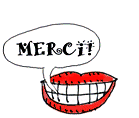 |
It takes years to learn a foreign language...many people
don't even try. However, you should take the time to learn a few basic
phrases and how to count to ten. It can be very useful and the local people
will appreciate your effort.
Speak simply. Say "menu" not "I would like a menu, please." Repeat your statement only once...slowly and without raising your voice. If this doesn't work, smile and say "thank you" in the foreign language. Note that most hotels provide free notepaper and envelopes in your room and you can usually purchase stamps at the front desk. But, be aware that you may get home before the postcards do! Note that U.S. telephone credit cards are accepted in many European countries. Use your credit card to call home (especially from hotels) to avoid high phone surcharges which may be added to your bill. |
 |
Jet lag may occur on European vacations. Avoiding alcohol
and eating light can alleviate it's effects. Drink plenty of non-alcoholic
beverages (like water) in-flight to avoid dehydration. And, place a pillow
behind the small of your back to avoid backaches when you get there.
Don't cram all your travel into one day. When planning your itinerary, make sure you allow time to get plenty of rest. Pack over the counter remedies that work best for headaches, upset stomach, allergies or diarrhea and a first aid kit with Band-Aids, an antiseptic and tweezers. This will alleviate the hassle of finding an unfamiliar cure for minor mishaps. And remember, always pack your prescription in your easily accessed carry-on luggage. If you need a doctor for a minor illness, you can trust the concierge of any hotel to give you a recommendation. If language is going to be a problem, call the American embassy or consulate for an English speaking doctor. |
Our professional travel staff
will assist you with all your European
travel needs. Stop in or call
us to book your European adventure!